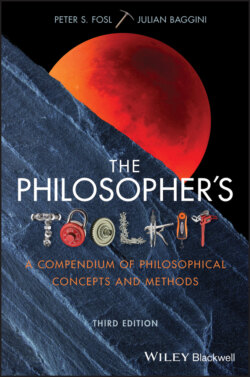Читать книгу The Philosopher's Toolkit - Julian Baggini, Julian Baggini - Страница 54
Informal fallacies
ОглавлениеWhat about fallacies that aren’t rooted in a faulty form at all but instead in characteristically misleading content? How do they go wrong? A well‐known example of an informal fallacy is the gambler’s fallacy – it’s both a dangerously persuasive and a hopelessly flawed species of inference.
The gambler’s fallacy often occurs, for example, when someone takes a bet on the toss of a fair coin. The coin has landed heads up, say, seven times in a row. On the basis of this or a similar series of tosses, the fallacious gambler concludes that the next toss is more likely to come up tails than heads (or the reverse). What makes this an informal rather than a formal fallacy is that we can curiously present the reasoning here using a valid form of argument, even though the reasoning is bad.
1 If I’ve already tossed seven heads in a row, the probability that the eighth toss will yield a head is less than 50–50 (that is, a tails is due).
2 I’ve already tossed seven heads in a row.
3 Therefore, the probability that the next toss will yield a head is less than 50–50.
The form is perfectly valid; logicians call it modus ponens, the way of affirmation (see 3.1). Formally, modus ponens looks like this:
1 If p, then q.
2 p.
3 Therefore, q.
The flaw rendering the gambler’s argument fallacious instead lies in the content of the first premise – the first premise is simply false. The probability of the next individual toss (like that of any individual toss) is and remains 50–50 no matter what toss or tosses preceded it.
Sure, the odds of tossing eight heads in a row are very low. But if seven heads in a row have already been tossed (a rare event, too), the chances of the sequence of eight in a row being completed (or broken) on the next toss is still just 50–50. Because this factual error about probabilities remains so common and so easy to commit, it has been classified as a fallacy and given a name. It’s a fallacy, however, only in an informal way.
Now, logicians speak in these precise ways about fallacies (as ‘formal’ and ‘informal’), but remember that sometimes ordinary speech deviates from logicians’ technical usages. Sometimes any widely held though false belief is described as a ‘fallacy’. Don’t worry. As the philosopher Ludwig Wittgenstein (1889–1951) said, language is like a large city with lots of different avenues and neighbourhoods. It’s alright to adopt different usages in different parts of the city. Just keep in mind where you are.
